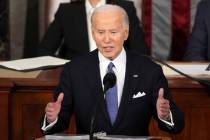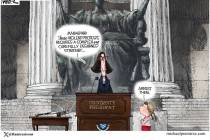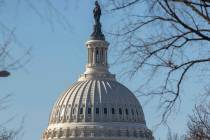EDITORIAL: In Washington, every dollar counts
The numbers behind Washington’s spending are so daunting that they verge on the imaginary. Congress just struck a deal on a $1.1 trillion omnibus spending bill that locks in hundreds of billions of dollars in deficit spending. The national debt recently topped $17 trillion. And because lawmakers refuse to address the long-term costs of entitlement programs, tens of trillions of dollars must be borrowed in the decades ahead to pay for promised benefits.
Figures such as these inevitably discourage lawmakers and appointees from seeking operational savings. Cutting a few million dollars from the government’s discretionary budgets is the equivalent of a typical American household passing up a cup of coffee. Considering the massive structural deficits created by Medicare, Social Security and Medicaid, some people entrenched within the beltway say saving what amounts to pennies isn’t worth the political struggle.
That’s crazy talk. If Congress can’t cut the little fluff or address obvious waste, lawmakers can never expect to change the culture that created so much debt in the first place. It’s impossible to save big if you first can’t save small.
That’s why Nevada taxpayers can take some heart in the efforts of their House delegation to save a few bucks on staffing and expenses. As reported Monday by the Review-Journal’s Steve Tetreault, Rep. Mark Amodei, R-Nev., led the way by announcing he’ll return about $104,000 in unspent office funds to the Treasury, about 8 percent of the $1.3 million each lawmaker receives for staff salaries, travel, and office supplies and equipment.
Rep. Steven Horsford, D-Nev., projects having $70,000 in unspent funds from 2013. Rep. Dina Titus, D-Nev., expects to return about $30,000, and Rep. Joe Heck, R-Nev., expects to return an as-yet uncalculated surplus from last year.
Could every lawmaker make do with even less? Of course. As the federal bureaucracy has grown larger and more powerful, so has congressional staffing. If lawmakers had less help, perhaps they’d be inclined to pass fewer costly laws.
But it’s instructive that Congress lacks the will to get behind something as indisputable as the annual “Wastebook” produced by Sen. Tom Coburn, R-Okla. His 2013 edition outlined $30 billion in easy cuts to foolish, low-priority and redundant programs and appropriations.
The savings achieved by Nevada representatives is a nice start. But Americans need and expect far more frugality from Washington. Our economy and standard of living depend on it.























